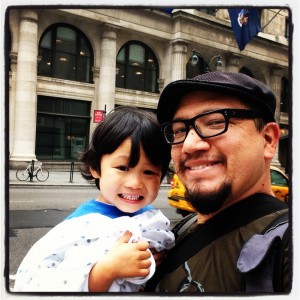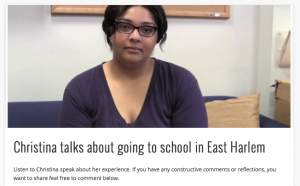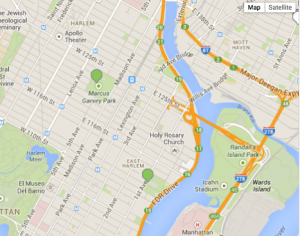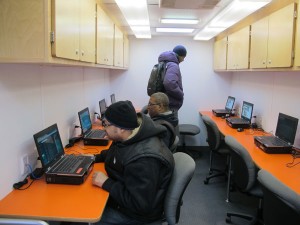 Edwin Mayorga describes himself as an educator-scholar-activist of color, as well as a parent, organizer, and doctoral candidate in Urban Education at the Graduate Center of the City University of New York. His recent work facilitating a digital participatory action research project explored how NYC education policies during the Bloomberg administration (2001-2013) have impacted “Latino core” communities like East Harlem. He and two youth co-researchers, Mariely Mena and Honory Peña, both East Harlem residents, designed and conducted the project, which they called Education in our Barrios.
Edwin Mayorga describes himself as an educator-scholar-activist of color, as well as a parent, organizer, and doctoral candidate in Urban Education at the Graduate Center of the City University of New York. His recent work facilitating a digital participatory action research project explored how NYC education policies during the Bloomberg administration (2001-2013) have impacted “Latino core” communities like East Harlem. He and two youth co-researchers, Mariely Mena and Honory Peña, both East Harlem residents, designed and conducted the project, which they called Education in our Barrios.
The goal of the project was to gather the perspectives of parents, youth, community leaders, activists, educators, and educational leaders who have been connected to public education in East Halem/El Barrio. The team recorded video interviews, digitally recorded stories (using vojo.co), collected archival materials, census data, and policy documents. This data informed their critical analysis of educational and related social policies to document how several generations of people see and experience public education reform in East Harlem.
 While the researchers wanted to use digital technologies as a way to connect to the community, the challenges they posed highlighted how the landscape of digital access, which is among other structural inequalities, impacts residents at both the individual level and larger social and economic level.
While the researchers wanted to use digital technologies as a way to connect to the community, the challenges they posed highlighted how the landscape of digital access, which is among other structural inequalities, impacts residents at both the individual level and larger social and economic level.
In a recent talk at the CUNY Graduate Center, Edwin talked about some the challenges of engaging the community with digital media, and understanding how they make use of it. He said,
“The digital does introduce new ways of engaging the world but not everyone is quick to adopt those practices.”
One simple, yet significant obstacle to adopting digital networked technologies is access and affordability. In recent years, New York has become a more digital city, but for whom? City parks have become increasingly wi-fi accessible, but as Edwin pointed out, most of the park land in East Harlem is on Randall’s Island, which is both less accessible and becoming increasingly privatized. Free wi-fi spots in East Harlem and many other low-income residential neighborhoods, are few, as this map from the NYC Parks department illustrates.
 In an area like East Harlem, many may not be able to afford in-home broadband access, making free, publicly-available networks that much more important. In the neighborhood, the public library and McDonald’s are the primary spaces that have it. Despite being a vital community resource, the library suffers from disrepair and, like all NYC public libraries, decreased funding which cause them to shorten hours and limit services. A recent article on NY City Lens, an online news site, compared the recently renovated Washington Heights library and the Aguilar Library, which is located in East Harlem. The article highlights the great demand for access to library computers and the frustrations users experience from long waits, time limits, and slow access.
In an area like East Harlem, many may not be able to afford in-home broadband access, making free, publicly-available networks that much more important. In the neighborhood, the public library and McDonald’s are the primary spaces that have it. Despite being a vital community resource, the library suffers from disrepair and, like all NYC public libraries, decreased funding which cause them to shorten hours and limit services. A recent article on NY City Lens, an online news site, compared the recently renovated Washington Heights library and the Aguilar Library, which is located in East Harlem. The article highlights the great demand for access to library computers and the frustrations users experience from long waits, time limits, and slow access.
Mayor Bill de Blasio called attention to the problem of uneven access as an issue of equality, social justice and economic mobility during his campaign and has said that the issue is a top priority for his administration. He has said that he will use the city’s regulatory, purchasing and franchising powers to pressure Verizon and other providers to increase access and lower costs to consumers.
In the meantime, the New York City Housing Authority has two vans equipped with eight computers and a printer, as well as high-speed wireless access that travel to parts of the city where connectivity is low. Hopefully, this innovative project, and other efforts to increase access and create a public network, will begin to balance out this inequality.



